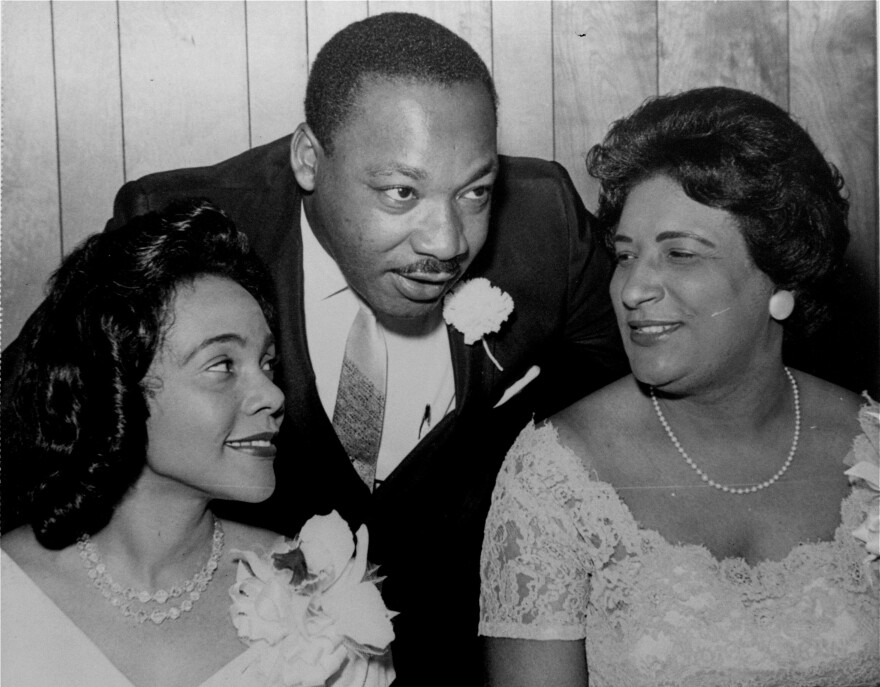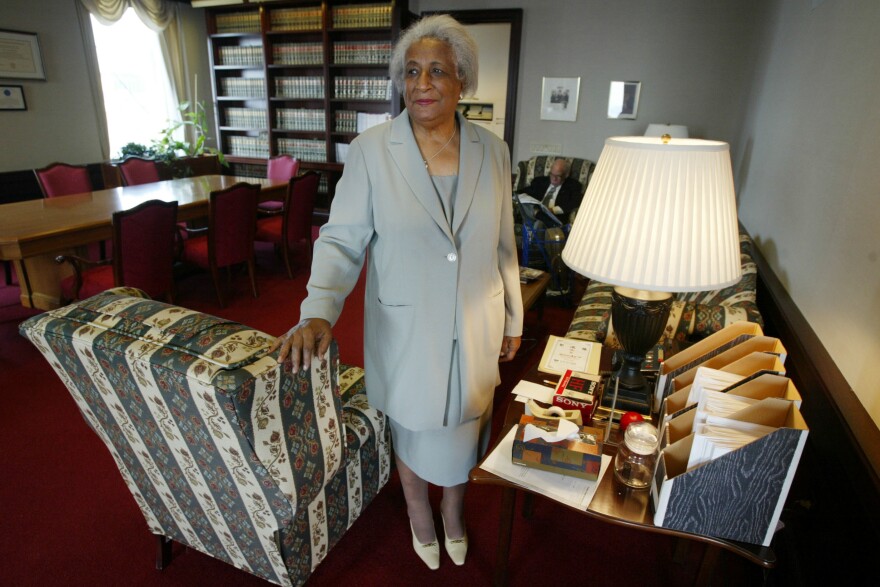In the 1940s and '50s, when Constance Baker Motley walked into a courtroom in the Deep South to try a case, people stared. And then they stared some more. For one thing, women lawyers were pretty rare at that time. For another, it was a safe bet that no one—regardless of race—had ever seen a Negro woman lawyer, let alone one with such imposing height and regal carriage. Add to that the fact that Motley was always impeccably turned out in a well-cut dress, high heels and a matching handbag, and often draped in her signature pearl necklace. She was, quite simply, a unicorn—one battling (genteely, but insistently) for civil rights.
The arc of Motley's life—as a lawyer, as a politician and eventually as the first Black woman to be appointed to the Federal bench – is outlined in a new biography, Civil Rights Queen: Constance Baker Motley and the Struggle for Equality. The author, Tomiko Brown-Nagin, is a history professor at Harvard University and dean of Radcliffe's School of Advanced Study. She also teaches at Harvard Law School. Motley, she says, is a heroine to her – but one whose legacy often gets overlooked in the broader world.
"She's far less known in the general public today than she deserves," Brown-Nagin says. "She was the counterpart to Thurgood Marshall, who was called Mr. Civil Rights and who was her mentor." Marshall, of course, was a charismatic lawyer and brilliant legal strategist who would eventually become the nation's first Black Supreme Court Justice. Attention focused on him anywhere he went, and associates like Motley were often in his shadow.
Brown-Nagin's book was an attempt to show that Motley was a civil rights legend in her own right, whose accomplishments still resonate today.
Ambitious from The Very Beginning
A product of striving, strict Caribbean immigrant parents, Motley grew up in New Haven, Conn. She was the youngest in a family of 12 children, and although she dreamed about going to college, her family had no money for that. Her mother managed the household; her father was a chef at Yale. Motley wanted something different for herself; she believed that her path to a more "elevated" life was through education.
After graduating high school, she had sporadic day jobs with the National Youth Administration; she was finally able to go college when a local philanthropist heard her speak at a gathering, was impressed and offered to fund her dream. Motley spent her first year at Fisk University in Nashville. She then transferred to NYU, where she got her undergraduate degree, and then Columbia Law School.

But upon receiving her law degree in 1946, most firms weren't hiring women, no matter how impressive their credentials—something newly-minted lawyers like Ruth Bader Ginsburg, Pauli Murray and Sandra Day O'Connor were discovering, too. Motley decided to try the NAACP's Legal Defense and Educational Fund, Inc., which devoted itself to achieving racial justice at the state, local and national levels, often through the courts.
The "Inc Fund," as the staff referred to it, was headed by Thurgood Marshall, who'd already become nationally known. "When she went to see Marshall, he hired her on the spot," author Tomiko Brown-Nagin says. Much of Motley's early work for the Inc Fund was spent drafting airtight legal arguments that could be used to good effect in court. In 1954, she wrote much of Brown v Board of Education – although the face of that case would be Thurgood Marshall, who argued it before the Supreme Court. (Marshall argued 30 cases before the high court, winning 29. Motley herself would go on to argue 10 cases before the Supreme Court, winning all but one of them.)
Mentored – and Overlooked – By a Master
Marshall had complete confidence in Motley, and in the '60s, at his behest, she took roughly two dozen trips to the Deep South as the Inc Fund sued to integrate public universities. She watched as Charlayne Hunter-Gault and Hamilton Holmes walked through jeering crowds in Athens, Geo., after judges ruled to desegregate their home state's flagship university. She accompanied James Meredith when he finally got to register at the University of Mississippi. And she made the same arguments—successfully—that brought integration to the University of Alabama and the University of Florida.
"It was dangerous work," Brown-Nagin says. Motley worried for her safety, and for the safety of the locals she was staying with, "because of course all the hotels — if there were any – were segregated," Brown-Nagin explains. And she worried about being separated for so long from her husband and son, Big Joel and Little Joel. But despite the hardships, Motley continued in her role for years.
In 1961, Thurgood Marshall left the Inc Fund to accept an appointment as a judge in the Court of Appeals for the Second Circuit. Many—including Motley—thought she was a cinch to succeed him. But although she was eminently qualified for it, the job was given to one of Motley's colleagues, Jack Greenberg, who had also worked closely with Motley on several cases.
"Constance Baker Motley often said that had there not been a Thurgood Marshall no one would ever have heard of her," Brown-Nagin asserts. "And so this mentor who had made her career, who had hired her in 1945, ended up denying her this job as director counsel of the NAACP LDF. And she believed it was, in part, because she was a woman. They did not see women as leaders. It goes to show that in all institutions, even institutions that are dedicated to the cause of equality—in this case, racial equality—there can be blind spots and inequities that one has to struggle against."
Despite her disappointment, Motley would stay at the Inc. Fund for a few more years, because, as Brown-Nagin says "she believed in the mission." But the New England native had begun to believe that while lawsuits were the way to break segregation in the South, the North required a different approach: legislation. So she left the Inc. Fund to run for the New York State Senate—and won. In 1965 she became President of the Borough of Manhattan—the first woman to be elected to that post. In both places she worked to pass laws that would give equal justice to people and communities that had been marginalized by mainstream society.
Hitting Her Career High Note
In 1966, Lyndon Johnson appointed Motley to the federal bench, as a judge for the U.S. District Court in Manhattan. It was a powerful, prestigious position, and given her background, Motley was closely scrutinized. During that time, she presided over what Brown-Nagin called "the most pioneering and controversial of Motley's career. That is a case on which she ruled on behalf of Martin Sostre, a prison rights activist who has himself imprisoned in a jailhouse, where she ruled that solitary confinement was against the Constitution. To great blowback in the law enforcement community."
She also presided over Ludtke v Kuhn, in which a young Sports Illustrated reporter, Melissa Ludtke, sued to be allowed equal access to the New York Yankees' locker room, where important post-game interviews were often held. The Yankees' lawyer argued the team locker room should be a space that guaranteed privacy; the often-naked men would be embarrassed to have women in the locker room. Motley saw the case as a denial of equal access to female journalists and famously decreed the athletes had a choice if women were in the locker room: "let them wear towels." She ruled for Ludtke.
"I am not a feminist."
Despite the Ludtke v Kuhn case, and other efforts to provide equal consideration for women in the workplace, Motley rejected the label feminist—even though some famous feminists, like Shirley Chisolm and Bella Abzug—were friends and colleagues.

"She didn't spend time articulating her feminism, but she certainly did it. She did it by being the symbol of opportunity as a woman and as a Black woman, and also doing the substance of the work," Brown-Nagin insists. "She was very strong in opening up opportunities for women, including through mentoring. She was a great friend to Sonia Sotomayor, the associate justice of the Supreme Court, who was appointed to the U.S. District Court when Motley was retiring as a judge ...I think it's a profound part of her legacy that she was the first in so many respects, but she made sure that she was not the only one," Brown-Nagin says.
In later years, Motley's reputation as a legal titan faded. The woman who'd spent much of her early professional life battling the system had become the system. The voices of activists and politicians who were pressing for Black power, for equal rights for women now—made Motley seem a little quaint by comparison.
"Motley had been fighting the system for many years, and then she became a decision-maker. Ultimately, I think in Motley's case and in many other instances, we learn that the logic of the system, the inequities of the system continue despite the individuals who are in charge, which is hard to swallow," Brown-Nagin says.
Constance Baker Motley's story is a chronicle of that balance. Stunning achievement, yes, says her biographer, "but it's also about reality. And the reality is that outsiders—people of color, women—face disadvantages in workplaces that others do not, and they have to find ways to work around them. And it comes at a personal and sometimes professional cost."
All costs that Motley was willing to pay. And the country has felt the effects of those sacrifices in myriad ways ever since.
Copyright 2022 NPR. To see more, visit https://www.npr.org.



